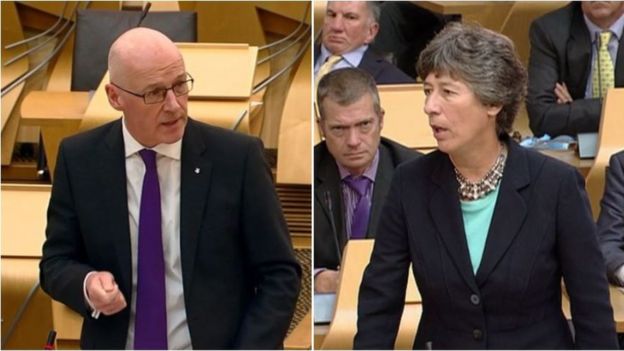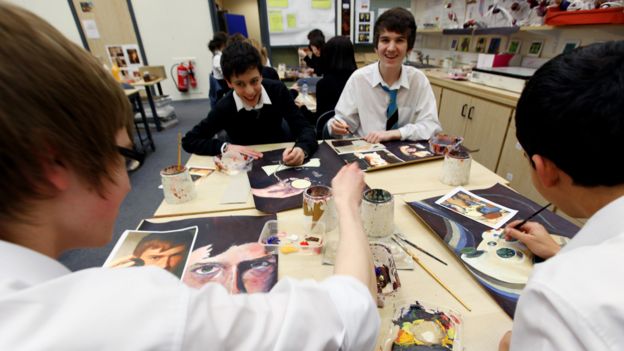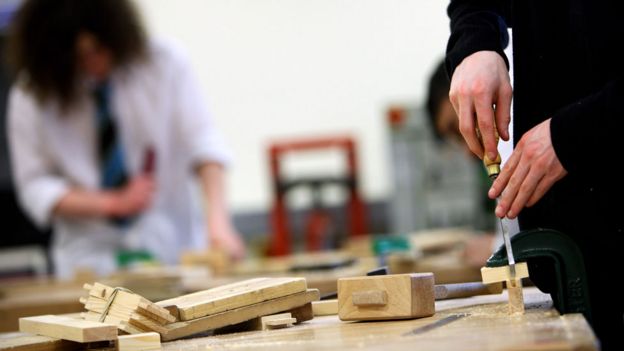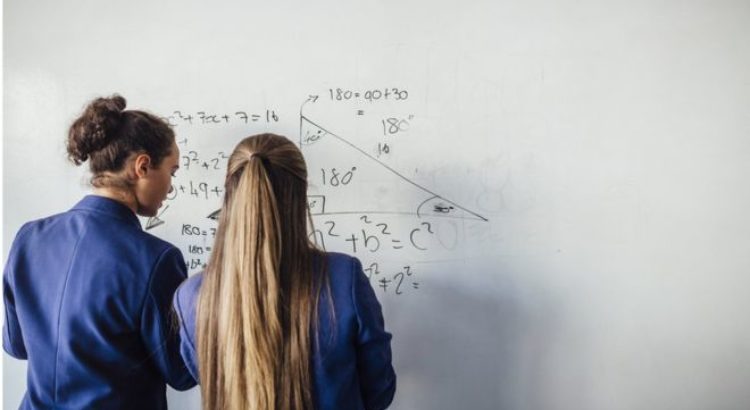The Scottish government has ordered a full review of the senior phase of education in secondary schools.
The move follows a critical report by MSPs on the Scottish Parliament’s education committee, who examined how S4, S5 and S6 work.
They found there had been a narrowing of the subject choices which were on offer for some pupils.
Education Secretary John Swinney said the review would identify any areas for improvement.
- MSPs call for ‘urgent action’ over school subject choice
- Scottish Conservatives call for ‘reset’ of Curriculum for Excellence
- Fears over fall in number of courses offered in Scottish schools
However, he defended the school curriculum and said it was possible the review would conclude that no change was required.
«The curriculum was designed to give flexibility to schools to design a curriculum that met the needs of their learners,» he told the BBC’s Good Morning Scotland programme.
«That will mean inevitably we will not have the same approach taken in every school in our country. I don’t believe we should have.»
S4, S5 and S6 classes – known as the senior phase of secondary education – were overhauled with the introduction of Curriculum for Excellence (CfE).
That resulted in a new set of qualifications – including National 4 and 5s, in effect replacing Standard Grades.
‘Lack of leadership’
Committee convener, Clare Adamson MSP said the breadth of learning available to pupils was rightly a cornerstone of Scottish education.
But she said a lack of leadership from Scotland’s public education bodies had affected subject choice.
She added: «Our committee found the lack of clear leadership from Education Scotland and SQA around the curriculum structure has resulted in some narrowing of subject choice.
«This was compounded by a lack of awareness from these bodies, who are charged with supporting Scottish education, about the extent of the problem and their role in leading change.
«These organisations need to take responsibility so that our education system does not let down Scotland’s young people.»

Ahead of the publication of their report, the committee heard concerns about:
- The varying number of subjects young people were able to in S4 at different schools
- The choice of subjects on offer
- The practice of teaching students studying for different qualifications together – for instance, Higher pupils learning alongside National 5 pupils
The MSPs also heard evidence that the changes had affected the number of pupils studying languages and Stem subjects – science , technology, engineering and maths.
The Committee was told that following the introduction of CfE, which changed the way education was delivered in Scotland, there had been confusion and inadequate support from Education Scotland and the SQA.
‘Detriment of pupils’
Despite «innovative work» to deliver a broad range of subjects in Scotland’s schools, the committee noted that one impact of the changes was the increase in multi-level teaching – where different levels of qualification were taught in the same class.
The report said this should never be used to solve resource issues or to the detriment of pupils’ educational experience.
The Scottish government said the review would ensure young people had the best possible opportunities.
 Image copyrightGETTY
Image copyrightGETTYDeputy First Minister John Swinney said learners in Scotland could choose from the «widest range of qualifications» ever offered and that CfE gave children and young people the skills and knowledge to achieve their ambitions.
He said: «Learners can now choose from the widest range of qualifications ever and what matters is outcomes – and last year a record proportion of pupils went on to positive destinations such as work, training or further study.
«Following a strong set of exam results, we must continue to ensure teachers can provide the most appropriate senior phase for their learners.»
‘Lost control’
Scotland’s largest teachers union, the EIS, said changes to the senior phase still had to achieve their full potential and cautioned against a radical overhaul.
General secretary Larry Flanagan said: «The EIS submission made clear that the senior phase has yet to achieve all of its aims but as far as teachers are concerned a period of stability and consolidation, especially around qualification changes, is now essential.»
However, Scottish Conservative education spokeswoman Liz Smith called the education committee’s report «deeply troubling».
She added: «Not only do they confirm that subject choice provision has been diminished in S4, with knock-on effects in S5 and S6, but they also confirm that the main education agency, Education Scotland, has lost control of the Curriculum for Excellence.
«The report also makes clear that these concerns have been made worse by teacher shortages and by an increasing number of schools being forced to adopt multi-level teaching.»
She said she did not believe a review was necessary, as the issue had been looked at thoroughly by Holyrood’s education committee. Instead she called for urgent action to address the problems.
 Image copyrightGETTY IMAGES
Image copyrightGETTY IMAGESAnalysis by BBC Scotland Education Correspondent Jamie McIvor
The senior phase in secondary schools is designed to try and meet the needs of a diverse range of learners.
Once S4 was about completing the O-Grades or Standard Grades started a year earlier. S5 and S6 were principally designed for those studying for Highers and the qualifications they led on to.
Today S4, S5 and S6 try to offer something for everyone and the bulk of students now remain in school until S6.
But the way the senior phase operates varies from school to school. Decisions are taken by individual schools or councils after consultations with parents.
The differences between schools are at their most obvious in S4. It used to be the normal practice in the overwhelming bulk of schools to give students the chance to obtain seven or eight Standard Grades by the end of S4.
Today the system varies: Some schools work on models, which would allow S4 students to study for up to six qualifications, some offer seven or even eight. A handful offer five or actively try to avoid S4 qualifications completely.
 Image copyrightGETTY IMAGES
Image copyrightGETTY IMAGESThey argue that what matters is the range of qualifications a student has obtained by the time they leave and their highest level of achievement in each subject.
Students in the senior phase can also get the chance to do a whole range of other courses and obtain other qualifications – for example, they may start college courses or do vocational or voluntary work.
There is meant to be parity of esteem between the choices on offer.
However, some parents fear that a student with the chance to get six National 5 qualifications in S4 is at a disadvantage over someone at another school who gets the chance to do seven or eight.
This also led to fears that choices were being restricted or that some subjects were being squeezed out.
Meanwhile, the practice of teaching different qualifications together – for instance having National 5 and Higher History students in the same class – has vocal critics but others believe it has a role to play on some occasions.
With many of these issues, part of the problem is that there are important, nuanced arguments to be made for and against.
But is there an argument for a degree of national standardisation?
Subject choices can also vary from area to area. For instance in urban areas it is possible to offer less popular Highers and Advanced Higher courses at central hubs – in rural areas this would be impractical but other options for distance learning may help.
Multi-level teaching may work well in some situations but not in others.
All these issues are likely to be looked at in the independent review.
Fuente de la Información: https://www.bbc.com/news/uk-scotland-49706462








 Users Today : 5
Users Today : 5 Total Users : 35460497
Total Users : 35460497 Views Today : 18
Views Today : 18 Total views : 3419376
Total views : 3419376